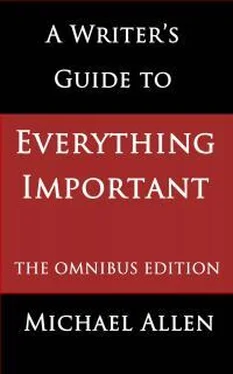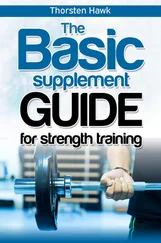And, to repeat the point made at the very beginning of this book, the extent to which pure chance plays such a large part in publishing means that it is not – definitely not – a business in which a writer can sensibly plan a career. Sometimes careers happen. But mostly they don’t.
For the time being, however, let us just note that the delay in finding someone to publish your book may be painful.
Not nearly as painful, however, as instant success. And, as you might expect by now, I’ve written a book about that too: A Writer’s Guide to Success by Michael Allen. In that book, I describe in some detail the fate of two young American writers, unknown to each other, who achieved massive success with their first books. They then came under enormous pressure to write a second book, equally good. And neither of them had the faintest idea how to do it. In the end they both committed suicide.
But we are jumping ahead of ourselves.
Let us assume, just to avoid discouraging you too much, that the day comes when you receive an envelope through the post – as was the case with the English writer John Braine, one heady day back in the 1950s. John Braine has related that he could tell that the envelope contained a contract, just from the shape and thickness of this envelope.
So there’s the contract. From a real live publisher. All ready for you to sign, on the dotted line.
So naturally you take it out of the envelope and sign it, right there at the breakfast table, right? Because at last, after years of labour and bitter disappointment, during which your friends keep asking, with the best of intensions, how the writing is going – now, at long last, you have something to tell them. And so the next time someone asks that question, you can say, in the most modest and casual of tones, ‘Oh, well, actually I’ve just signed a contract with Bootsie & Snudge.’ Or Clapham & Irons. Or whoever.
So naturally you’re going to sign it. Aren’t you?
Well yes. Almost certainly you are. Especially if it comes via an agent – an agent who, heaven knows, it took you fifteen years to find, and in whom you had precious little confidence, because he was relatively new to the business. So you raise your pen, your heart beating so fast that you have to pause for a minute to let it settle down.
That pause is just as well. Because the likelihood is that the contract has certain drawbacks; as well as all the obvious advantages.
You see, for the two hundred years, at least, publishers have been in the happy position of having hundreds – indeed thousands – of keen and eager aspiring novelists, all queuing up to offer them books for publication.
The truth about this situation – as I have said several times before in other books, because it can’t be repeated too often – the truth about this situation is that all these wannabe writers are mugs, suckers, and fuzzy thinkers. From the employment point of view they are complete fools.
In what other industry, I ask, can an employer find staff who are willing to work hundreds of hours without receiving a penny in payment? These slaves, for that is essentially what they are, do not even get food and board. They work for years on end, giving up all their spare time to their writing project, alienating boyfriends, fiancés and husbands, abandoning even their favourite television programmes, all in the statistically ridiculous hope and expectation that one day, if they write enough words and knock on enough doors, they might, if only by accident, write a novel which makes it into print.
In order to justify to themselves the enormous sacrifices which have to be made, just to produce a finished manuscript of book length, most of these writers have to convince themselves that, once published, their book will inevitably be a massive hit. Hollywood beckons.
This is the basic situation in which writers and publishers find themselves.
The result is that, for many decades, publishers have known that a writer who is offered a contract will hardly be able to restrain themselves from signing the last page of it without even reading what has gone before.
Because what is the alternative? The alternative is to go back to the wearying search for a publisher. Starting again from scratch. And, if you were very lucky, and actually managed to find another interested publisher, there was always the possibility that the new publisher would offer you terms which were even more disadvantageous than the first one.
So naturally you sign. You’re a success. Of a sort. At last. Your mother will cry with happiness.
2.7 The publisher’s contract
I’m not going to go into detail. But I hope I have already made it clear to you that, in this particular game of poker, the publisher holds all the good cards. For decades – possibly over a hundred years in some cases – the publisher has become accustomed to having the writers sign any sort of contract, no matter how appallingly bad it may be, because there is no practical alternative.
Here’s what one experienced American media lawyer has to say about publishers’ contracts in general. His name is David Vandagriff, and he runs a blog called The Passive Voice.
‘After having reviewed many, many agreements and proposed agreements between traditional publishers and authors, [I am] prepared to say these contracts, as a group, stand apart from the general run of business agreements as conscience-shocking monstrosities. They’re simply designed to screw authors and to give publishers control over their work that is far beyond what is regarded as reasonable in the rest of American business.’ (The UK is no different, by the way.)
I hope that’s clear enough for you.
Unless your name is Dean Koontz or Nora Roberts, you are going to get offered a contract which gives most of the money to the publisher, and gives you as little possible. And you will sign it and think yourself lucky.
I will mention just two dangerous clauses, in a contract which is full of them.
First is the non-compete clause. This prevents you from writing anything – probably anything at all – which might compete with and thus reduce the sales of the book referred to in the contract. In a worst-case scenario, if you’re a writer of romances, this could prevent you from writing any other romance for any other publisher for ever and ever amen.
Another key clause is the reversion clause. This specifies the ways in which you may, at some point in the future, ask for the rights licensed under the contract to be returned to you, so that you can sell them to someone else perhaps.
Well, let’s just say that, under a standard traditional publishing contract, in both the UK and the US, you are going to be licensing rights for the whole of your lifetime plus 70 years. So, if the company is making good money out of you, and wants to hang on to your rights, you are never going to get them back.
I’m just saying this so’s you know, that’s all. Not because I want to put you off. I’m just making sure that you realise that not everything is going to be sweetness and light for ever more, just because you’ve been offered your first contract.
And if you want to know more – and you should want to know more, go to the contracts section on David Vandagriff’s Passive Voice web site and read all the grisly details. It will take you quite a while.
Oh, and by the way. Here’s a late note, something I noticed the day after I thought I was finished with writing this section. David Vandagriff has just pointed out the following:
‘The standard warranties of almost all publishing contracts make the author liable to pay all costs arising from the publication of a book that violates the laws of any other country regardless of whether the author has any knowledge of the laws of another country.’
Читать дальше












